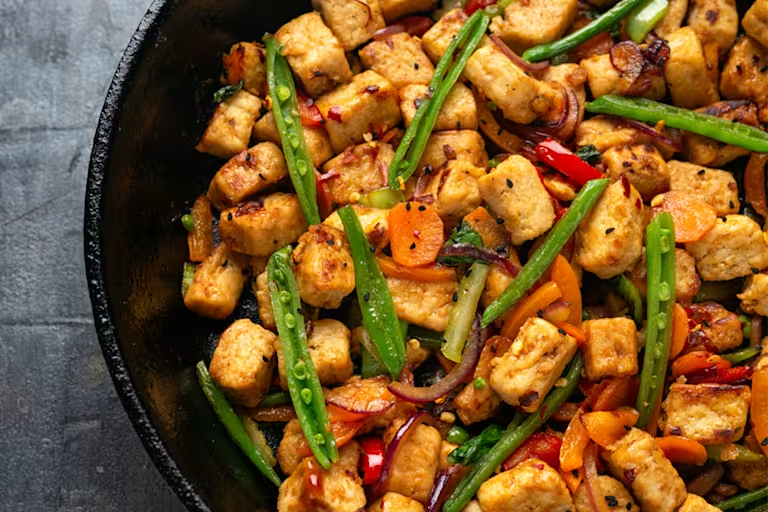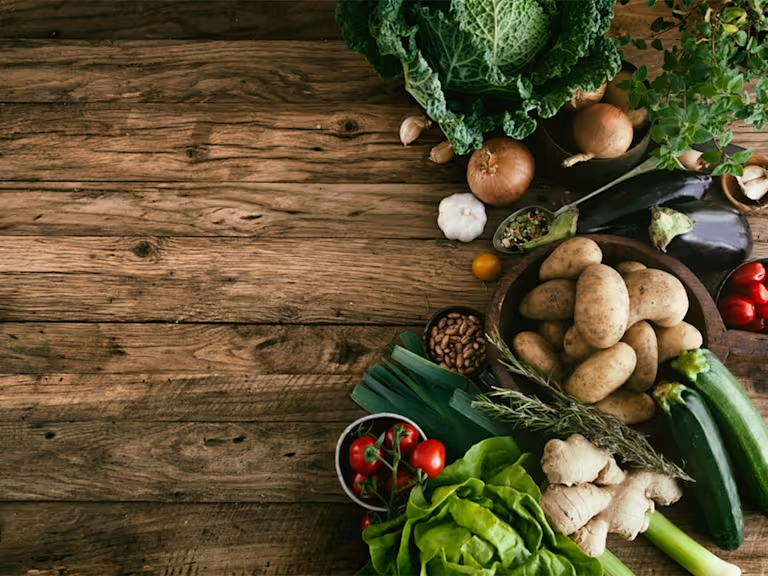
Mock Meat vs Plant-Based Protein: What’s the Difference?

Mock meats have been around for generations in Asia, as vegan alternatives to meat. With the new plant-based products now sweeping the supermarket aisles, you might be wondering about the difference between traditional mock meats and these newer products found as nuggets, burgers, and other forms.
It turns out there are significant differences between these two meat-replacement alternatives in terms of production techniques, ingredients, and nutritional profile.
Here, we explore all the essential differences, with a focus on nutritional value and the benefits of meat-free eating for health.
So what are mock meats and plant-based proteins?
Mock meats have been around for ages in Asia, and they’re typically made from wheat gluten. You can find these traditional mock meats in the form of sausages, nuggets, spam, and minced meat.
Plant-based proteins, on the other hand, are modern meat-free products made from ingredients such as pea, soy, mung bean, and rice proteins. They could also be made from whole-food proteins such as jackfruit and lion’s mane mushrooms.
The fundamental differences between mock meat and plant-based proteins centre on ingredients, nutritional value, and taste. Traditional mock meats are highly processed, offer lower nutritional value, and don’t taste as close to real meat as the newer plant-based proteins.
A nutritional comparison
As mentioned above, traditional mock meats tend to be highly processed, offering minimal nutritional value and using considerable amounts of unhealthful additives and salt. Some have even been found to contain animal-derived ingredients.
The newer plant-based proteins have been created from extensive research and are constantly being improved on by researchers focusing on production technology, biochemistry, and nutritional profile. They tend to provide higher nutritional value than meat, with no cholesterol, more fibre, and less saturated fat.
Good levels of protein and supplementation with essential nutrients like B12 and zinc are also commonly associated with plant-based proteins. Some plant-based meats use healthier ingredients like coconut oil and beet juice to imitate the fat and appearance of meat.
As such, plant-based meats are generally healthier than traditional mock meats, and they are also generally more healthful than real meat. However, one similarity between the two is traditional mock meats, although high in additives, can also offer good levels of protein. If it’s made from vital wheat gluten (seitan), which is common for mock meats, then it’s a good source of protein, not factoring in the addition of additives.
Plant-protein diets have great benefits
Protein is an essential macronutrient in the human diet. As a nutrient, it’s critical for healthy hair, nails, muscle, tissue repair, and other biochemical processes. About 20% of your body is made from protein. You need around 0.8 grams of protein for each kilogram of body weight per day.
There’s no difference between animal and plant-based proteins in terms of providing complete proteins for the body. Both types contain the same 22 amino acids, though in different ratios. In addition, vegan-friendly foods like pumpkin seeds, chia seeds, hemp seeds, quino, buckwheat, and soy contain the nine essential amino acids that your body can’t synthesise by itself.
Plant-based proteins can give you all of your essential amino acids, without the high calories, cholesterol, and saturated fat associated with meat. Given this, plant-based proteins can be beneficial for weight loss. Diets high in plant protein have been linked to lower body weight, cholesterol, heart disease, and blood pressure levels. A reduced risk of stroke, cancer, diabetes, and death from heart disease compared with non-vegetarians has also been identified.
How does Quorn do protein?
Quorn mycoprotein is a super protein that tastes great and supports your good health and the welfare of the planet. We start with a natural, nutritious fungus (Fusarium venenatum) that grows in soil. We utilise the same age-old, simple fermentation process used to produce beer, yoghurt, and bread to grow our mycoprotein, rather than using chemical processes to extract protein isolates. The result is a complete protein with all nine essential amino acids, and one that’s comparable to beef and chicken for protein levels. Moreover, it’s high in fibre and low in saturated fat, with a texture identical to meat. Quorn mycoprotein really satiates and helps to create the amazing taste and texture that Quorn products are loved for.
Not only that, our mycoprotein is sustainable and friendly towards the environment. Our vertical-farming approach delivers maximum land efficiency, as a result, we’ve reduced the carbon footprint of our factories by 33%. Quorn’s mycoprotein uses seven times less land than soy. It uses 90% less land and water than some animal protein sources, and has a carbon footprint 40 times lower than beef and six lower than chicken. In terms of water, we require 30 times less water than beef and six times less water than chicken. Our Spaghetti Bolognese, for example, has 90% less saturated fat than a beef version. Using our delicious mince instead of beef mince in just one meal saves you greenhouse gas emissions equivalent to charging your phone for over three years.
As a reflection of Quorn’s green approach, Carbon Trust has certified the carbon footprint of Quorn mycoprotein since 2012, which has reduced the carbon impact of mycoprotein by 32%. This makes it the first meat-free protein source to have third party carbon footprint accreditation.
Try Quorn today for a healthier you tomorrow
Quorn’s products aren’t just good for you and for the planet; they taste great. Our range of vegetarian and vegan products make it easy for you to create delicious, nutritious meals every time.
Ranging from mince, pieces, and fillets to burgers, nuggets, sausages, and patties, Quorn’s selection gives you the versatility and convenience to make healthful versions of your family’s favourite recipes.
Try our mycoprotein-based product range for yourself today, to see what all the fuss is all about!




